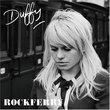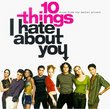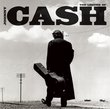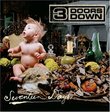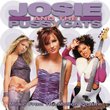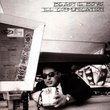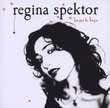| All Artists: Bruno Coulais Title: Coraline Members Wishing: 2 Total Copies: 0 Label: Koch Records Release Date: 2/10/2009 Album Type: Soundtrack Genres: Special Interest, Pop, Soundtracks Style: Number of Discs: 1 SwapaCD Credits: 1 UPC: 099923474128 |
Search - Bruno Coulais :: Coraline
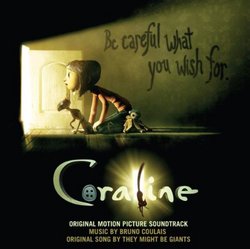 | Bruno Coulais Coraline Genres: Special Interest, Pop, Soundtracks
Combining the visionary imaginations of two premier fantasists, dirctor Henry Selick ("The Nightmare Before Christmas") and author Neil Gaiman (Sandman), "Coraline" the movie is a wondrous and thrilling, fun and suspensefu... more » |
Larger Image |
CD DetailsSynopsis
Album Description Combining the visionary imaginations of two premier fantasists, dirctor Henry Selick ("The Nightmare Before Christmas") and author Neil Gaiman (Sandman), "Coraline" the movie is a wondrous and thrilling, fun and suspenseful, adventure that honors and redefines two moviemaking traditions. Based on the best-selling book "Coraline" the movie is a stop-motion animated feature, and - as the first one to be conceived and photographed in stereoscopic 3-D, is unlike anything moviegoers have ever experienced before. The Soundtrack, produced by award-winning french composer Bruno Coulais, sets the perfect tone for the suspenseful and wonderful world created in the film, and features a new original song by They Might Be Giants. Similarly Requested CDs
|
CD ReviewsExpect the Unexpected Melissa Henstra | Florida | 02/04/2009 (5 out of 5 stars) "I don't usually buy a soundtrack before seeing the movie it belongs to, but I had to make an exception for the Coraline. To the point that I bought it at quarter after midnight on Feb. 2 then settled in for some serious listening. My first impression was that The soundtrack sounded more or less the way I'd imagined it would. Meaning highly atmospheric and slightly well, more then slightly excentric. Bruno Coulais seems to have made a deliberate effort to create music that is not easily defined. I have to say in my opinion he succeeded. The music for Coraline to me most resembles somthing like an auditory jigsaw puzzle where the pieces don't seem like the should fit together but somhow they do beautifully. Admittedly it took a few listens to fully grasp what Coulais intended, and the more I listend the more I got it, and I realized the genius of it. At first I was a little put off by the lack of clearly defined themes and motifs found in more tradtional film scores. You can't really point to any one of the 32 songs on the album and say, here is Coraline's theme, or there is the theme of the Other Mother. And yet there is a subtle character signature on some of the pieces. While other songs feel more like vivid tableaus. In short the Coraline Soundtrack does what a really good soundtrack is meant to do, which is to tell a story in and of it's self, without depending on the film. Bruno Coulais manages to capture with stunning uniquenss the creative force that is Neil Gaiman's Coraline. Just a few things to note. I'n to sure that this album will be everyones cup of tea, that is an almost experimental vibe to the music which could turn some poeple off. There is quie a bit of discord layed in that isn't really condusive to relaxing or working to, another words some people may not find this the best backround muisc. Stand out tracks include: 1 End Credits 3 Instellation 4 Wybie 5 Exploration(The song I think of as Coralines theme) 9 Fantastic Gaden 13 Dreams are dangerous 14 Sirens of the Sea 15 In the Bed 17 It Was Fantastic 18 Ghost Children 23 Alone 25 Reunion 27 The Theater 32 The Party Also recommended The Chorus Bruno Coulais Pushing Daisies Soundtrack " A first-class soundtrack. Instantly joins the ranks of my al D. Missman | United States | 02/12/2009 (5 out of 5 stars) "In the two days since I purchased the Coraline soundtrack, several of its tunes have found their way to my heart like a lullaby from the Other world. But, for now, we need not even discuss the movie these tracks were written for. Context aside, let us simply discuss Bruno Coulais' superb album that only happens to be called "Coraline Original Motion Picture Soundtrack." Let's get this out of the way first: movie scores by design are primarily ambient and Coraline is no exception. Typically all I can salvage from a soundtrack are two or three cues that carry the film's main themes. So it's a rare and happy day when I can enjoy all of, most of, or even much of a film's score. A robust collection, Coulais' Coraline measures in impressively at just over 1:3 excellence to ambience. For sheer value this allows me to recommend it as a quality soundtrack. But it's the brilliance of these tracks that propels the collection into my toppest of tops. Apart from the mentioned ambient tracks, the sounds of Coraline range from the dreamy, dulcet voices of The Children's Choir of Nice (Nice, France, that is) to the rousing, often dark, conjurations of the Hungarian Symphony Orchestra. The melodies carried by the children's choir evoke the senses of comfort, innocence, and reverie. It's easy on the ears and will lull you right back to your childhood. The darker pieces maintain the choir element, preserving the dream-like overtones, but they remove the feeling of comfort entirely, giving you the eerie sense that you're falling into the clutches of a nightmare. I particularly enjoy the darker pieces. These would be "End Credits," "The Supper," and "Ghost Children." It would be selling Coulais short to compare him to another artist, but these pieces, along with the edgy "Mice Circus," seem almost an homage to the early works of the great Danny Elfman. Or it may just be that these pieces all appeal to the same part of my taste. Either way, it's incredibly refreshing to hear music that recalls that forgotten, beautifully weird aesthetic. Is Bruno Coulais the next Danny Elfman? Who knows. All I know is that if this soundtrack were an LP I'd already have worn out the grooves. When I'm not listening to the mentioned tracks (typically on constant loop), I'm listening to the softer side of the soundtrack; the choir pieces. There are actually quite a few tracks featuring the choir themes, but my favorites of these have been "Installation," "Exploration," and "Mechanical Lullaby." So soft, so sweet. It's the perfect relief from the more intense tracks. These are the butter that helps everything slide, allowing me to listen to the soundtrack all day long. Naturally I'd recommend this album for anybody who likes film music, but I would especially recommend it for those, like myself, who have a particular taste for the beautiful, the dark, and the weird. It has instantly become one of the proudest additions to my collection, and I know I will be enjoying it for many years to come." Macabre delight Jon Broxton | Thousand Oaks, CA | 06/23/2009 (4 out of 5 stars) "Coraline is the latest film from Henry Selick, the man who actually directed Tim Burton's The Nightmare Before Christmas. Like its illustrious predecessor, Coraline is a stop-motion animation, several years in the making, and is based on a story by acclaimed fantasy author Neil Gaiman.
Following his Oscar nomination for his work on Les Choristes (The Choir) in 2003, I had expected Bruno Coulais to become a more familiar musical voice in Hollywood. He's certainly proved he has a great deal of talent and versatility throughout his career, tackling everything from action thrillers (Les Rivières Pourpres/The Crimson Rivers) to wildlife documentaries (Microcosmos, Winged Migration), but for whatever reason it never quite happened. Coraline is actually Coulais' first Hollywood studio picture, but whether it will provide that breakthrough remains to be seen; it's possibly the oddest mainstream score I have heard in quite some times, and I really can't make up my mind whether I like it, whether I'm fascinated by it, or whether it's just so bizarre I want to keep listening to it to make sure I'm not hallucinating. People often label Danny Elfman as the master of the musically macabre, but there's really nothing in his filmography which compares to the strangeness of Coraline. At first glance, the musical make-up of Coraline seems fairly straightforward: the Budapest Symphony Orchestra, a children's choir, and glittery solo instruments ranging from glass harmonicas and waterphones to African and toy percussion. It's how Coulais uses these elements which makes Coraline so unusual. The album actually begins with the "End Titles", a dizzying amalgam of scampering strings, undulating harp waves, and Children's Choir of Nice singing breathy, ghostly nonsense lyrics in what sounds like a combination of faux-French and mindless baby babble. It's a beguiling, utterly fascinating opening, which sets the tone for the rest of the album; that of a skewed, tormented fairytale turned on its head. Throughout the score the orchestra has a light, elusive quality, often played at each instrument's highest register, and which is regularly infused with twinkly, scurrying plucked instrumental performances: harps, glockenspiels, chimes and bells, marimbas, and the omnipresent glass harmonica, giving the score an overarching sense of gloomy beauty, fragile delicacy, and innate peculiarity. There are moments of genuine tonal charm: parts of "Wybie", "In the Bed" and "It Was Fantastic", for example, are quite lovely, while "Let's Go", "Playing Piano" and "Dangerous" provide a few brief moments of drama and power through more strident orchestral performances. For the most part, though, Coulais seems to be at pains to keep his audience intentionally off-balance, using instruments in odd or unexpected ways or in surprising combinations, as if alluding to the fact that Coraline's ventures into this new, fantastical world are not quite what they seem. Other cues of note include "Bobinsky", a quirky march with prominent wet brasses; "Fantastic Garden", an unexpected - but appropriately skewed - jazz piece with a stand up bass, hooting saxophones, and even a sitar; "Mice Circus", which features deconstructed big top music which has to be heard to be believed; and "Spink and Forcible", which for reasons yet to be revealed breaks out into a distorted Latin rhythm. The twangy, boingy percussion in "Wybie That Talks" makes it possibly the most bizarre cue on the album. The choir features prominently throughout the entire score, further enhancing the magical, fairytale feeling; cues such as "Installation", "Exploration", "The Supper" and "Alone" feature some lovely vocal performances, tweedle-deeing and lah-de-dahing with eerie, inquisitive whimsy. Conversely, "Ghost Children", "Coraline Dispair", and the creepily beautiful "You Know I Love You" use the voices to slightly more sinister effect, reminding listeners that, underneath it all, Coraline is still a horror story about shady characters doing evil things to the unwary. A number of cues actually feature brief, sung vocal performances with proper lyrics - "Dreaming" and "Sirens of the Sea" for example - although the new song from alternative rockers They Might Be Giants, "Other Father Song", which is heavily advertised in the soundtrack's promotional material, is nothing more than a curious 28-second diversion. As I was writing this review I was trying to think of scores which sound similar to this one, to give readers some basis for comparison, and I have to admit I'm struggling to think of anything. Parts of it have a Nightmare Before Christmas vibe, while others have the same spiky quality of Thomas Newman's children's scores like Lemony Snicket. Elsewhere, it even reminded me of some of the more psychedelic music The Beatles wrote during their "experimentation" days. Yes, I did say The Beatles. For the most part, though, Coraline sounds completely unique, unlike anything I've heard before, and that in itself is a rare and encouraging thing. Having said all that, it's still very hard to get away from the fact that Coraline remains a very, very unusual score. Roger Ebert, in his review of the film, says "The ideal audience for this film would be admirers of film art itself, assuming such people exist. Selick creates an entirely original look and feel, uses the freedom of animation to elongate his characters into skeletal spectres looming over poor Coraline". The same can be said of Coulais' score, which may appeal more to admirers of the art of film music itself, who can appreciate the detail of unusual orchestration or intricate compositional techniques, and less to those who simply want to listen to something nice; as such, the score's high ranking comes from the fact that I fall into the former camp." |

 Track Listings (32) - Disc #1
Track Listings (32) - Disc #1
